

The Global MB Watch (globalmbwatch) sur Twitter. Russia Checks U.S. Nuclear Missile Silos Amid Tensions. PrintShareEmailTwitterFacebookLinkedIn The standoff over Russia's incursion in Ukraine has not prevented Moscow from verifying the elimination of 18 U.S. missile sites, the Associated Press reports.
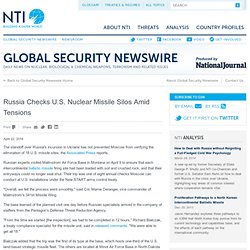
Chemical Weapons, Syria and the International Response to WMDs. Chemical weapons are part of a very small club of armaments known as “weapons of mass destruction” or WMDs.
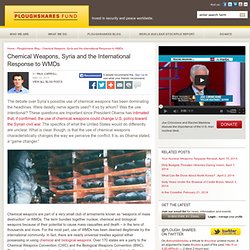
The term bundles together nuclear, chemical and biological weapons because of their potential to cause mass casualties and death – in the tens of thousands and more. For the most part, use of WMDs has been deemed illegitimate by the international community. In fact, there are nearly universal treaties against either possessing or using chemical and biological weapons. Over 170 states are a party to the Chemical Weapons Convention (CWC) and the Biological Weapons Convention (BWC). These pacts require signatory nations declare any chemical or biological stocks they may have and destroy those weapons.
Agreements alone, however, aren’t enough. Treaties must be more than paper shields; they need real life follow-through. The global community could have done more to bring Syria into line before the current crisis erupted.
Cluster Munitions, joint media release, 1 April 2013, Australian Minister for Foreign Affairs. Australia has become a party to the Convention on Cluster Munitions with legislation commencing today (April 1, 2013) making it an offence in Australia to develop, keep or transfer land mines or cluster munitions.
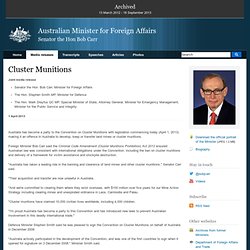
Foreign Minister Bob Carr said the Criminal Code Amendment (Cluster Munitions Prohibition) Act 2012 ensured Australian law was consistent with international obligations under the Convention, including the ban on cluster munitions and delivery of a framework for victim assistance and stockpile destruction. Deterring Syria’s CW. A minor miracle the other day.
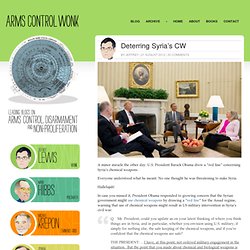
U.S. President Barack Obama drew a “red line” concerning Syria’s chemical weapons. Everyone understood what he meant. No one thought he was threatening to nuke Syria. Assured Destruction. Secretary of Defense Robert McNamara had his hands full trying to set criteria for nuclear requirements at a time when the training and ethos of the Strategic Air Command called for taking the initiative and winning decisively.
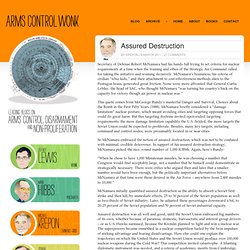
McNamara’s braininess, his coterie of civilian “whiz kids,” and their attachment to cost-effectiveness methods alien to the Pentagon brass, generated great friction. Arms Control Now: The Blog of the Arms Control Association. March 1 marks the 12th anniversary of the 1999 entry into force of the Mine Ban Treaty, which seeks to eliminate the use of one of the most destructive and indiscriminate weapons of war.
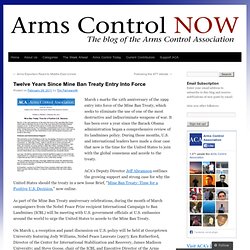
It has been over a year since the Barack Obama administration began a comprehensive review of its landmines policy. During those months, U.S. and international leaders have made a clear case that now is the time for the United States to join with the global consensus and accede to the treaty. Convention sur l'interdiction des mines antipersonnel. Un article de Wikipédia, l'encyclopédie libre.
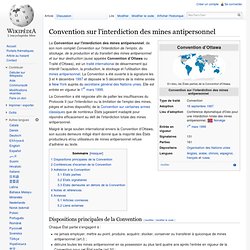
Convention d’Ottawa En bleu, les États parties de la Convention d'Ottawa. La Convention sur l'interdiction des mines antipersonnel, de son nom complet Convention sur l'interdiction de l'emploi, du stockage, de la production et du transfert des mines antipersonnel et sur leur destruction (aussi appelée Convention d’Ottawa ou Traité d'Ottawa), est un traité international de désarmement qui interdit l'acquisition, la production, le stockage et l'utilisation des mines antipersonnel. La Convention a été ouverte à la signature les 3 et 4 décembre 1997 et déposée le 5 décembre de la même année à New York auprès du secrétaire général des Nations unies. Elle est entrée en vigueur le .
Malgré le large soutien international envers la Convention d'Ottawa, son succès demeure mitigé étant donné que la majorité des États producteurs et/ou utilisateurs de mines antipersonnel refuse d'adhérer au texte. 2013-04-04 Jean-Marc Boivin: Mines antipersonnel: le combat contre les armes des lâches n'est pas encore gagné.
Biohazard. No FOIA Request Needed: The Chemical and Biological Warfare Coll. One box from the Chemical and Biological Warfare Collection in the Archive's reading room.
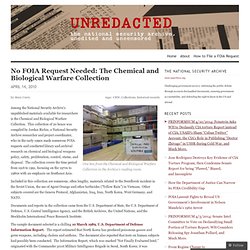
Among the National Security Archive’s unpublished materials available for researchers is the Chemical and Biological Warfare Collection. This collection of 20 boxes was compiled by Jordan Richie, a National Security Archive researcher and project coordinator, who in the early 1990s made numerous FOIA requests and conducted library and archival research on chemical and biological weapons policy, safety, proliferation, control, status, and disposal. The collection covers the time period from 1916 to 1991, focusing on the 1970s to 1980s with an emphasis on Southeast Asia. After New START: Challenges and Opportunities for 21st Century Arms Control. Author: Jonathan Pearl, Stanton Nuclear Security Fellow, 2010-2011 February 18, 2011 Bulletin of Atomic Scientists Now that the New Strategic Arms Reduction Treaty (New START) has finally entered into force, how will the Obama administration achieve further bilateral nuclear reductions with Russia?
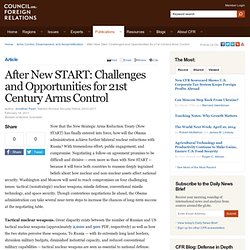
With tremendous effort, public engagement, and compromise. Negotiating a follow-on agreement promises to be difficult and divisive -- even more so than with New START -- because it will force both countries to reassess deeply ingrained beliefs about how nuclear and non-nuclear assets affect national security. Washington and Moscow will need to reach compromises on four challenging issues: tactical (nonstrategic) nuclear weapons, missile defense, conventional missile technology, and space security. Though contentious negotiations lie ahead, the Obama administration can take several near-term steps to increase the chances of long-term success at the negotiating table. Tactical nuclear weapons.
Abolishing Chemical Weapons: Progress, Challenges, and Opportunities.